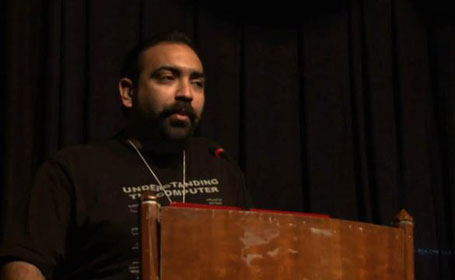For more on radio and music business news. | Click on RNMBiz

MUMBAI: Wannabe rockers who plan to get in the business of rock music better leave their attitude outside because the industry has no fairy tale stories. The same rules that apply in any other business or profession apply to the rock-music biz.
“Nobody owes you anything and it will take time to achieve success. One must be ready to face failures otherwise play at home and disturb your families,” Only Much Louder (OML) festival director Dhruv Jagasia said.
Speaking to industry professionals, artists and students at the recently concluded Music Works seminar organized by True School of Music, Jagasia said that it was imperative for artists- solo or bands- to go beyond their knowledge of musical skills and learn how the business worked if they wanted to survive.
Many bands today know little beyond playing their music. Their awareness and skills of how to get best deals, keep in touch with fans and be in the news, is generally poor.
“When I inherited Indian Ocean as their manager, I started by replying their emails. They had left 15,000 mails unanswered to which I replied to every one of them. This is the kind of lapses bands can get into. The Midival Punditz on the other hand took the initiative and started the “Cyber Mehfil” in Delhi where they worked out a deal with the owner of the joint to play there and start their fan base. They didn’t know where they were going but took the initiative,” he said.
After the adrenaline rush of performing on stage or signing a deal subsides, it’s pretty much back to the grind though it may not be as bad as a 9-5 job. Even established professionals like Jagasia who manage top acts like Indian Ocean, Midival Punditz and Karsh Kale still don’t drive a fancy car or fly First Class (unless touring with their clients).
The third aspect of the (music) business artists must learn is that it takes time to make a name and achieve success. Indian Ocean when they started out did only two shows in their first two years of existence. So bands and artists should be ready to struggle- unless you have loads of money. If you are loaded, you might as well organize your own show and invite people, he pointed out.
“I got to manage a band like Indian Ocean after they had already established themselves. I don’t think I have in me what it would take to take a fresh band forward.”
The key is to know that music is a journey and expectations of instant stardom and wealth are bound to disappoint. And to survive and move ahead in the industry, everyone had to balance their passion with business sense.
A case study of how one could balance and complement the two is OML’s ‘NH7 Weekender’ festival. The three-day indie music fest which was started in 2010 at Pune has a policy of not having a headliner but a list of indie artists who perform during the event. Following its success, it has expanded to Bangalore and Delhi.
“We realized that if we had a headliner for any of our fest, we would start competing with other festival organizers with deeper pockets. So how does a music festival with no headliner compete with one that has a headlining act? By making it a great experience and ensuring that the ticket buyer is as important as the artist. The biggest struggle is sticking to your goals.”